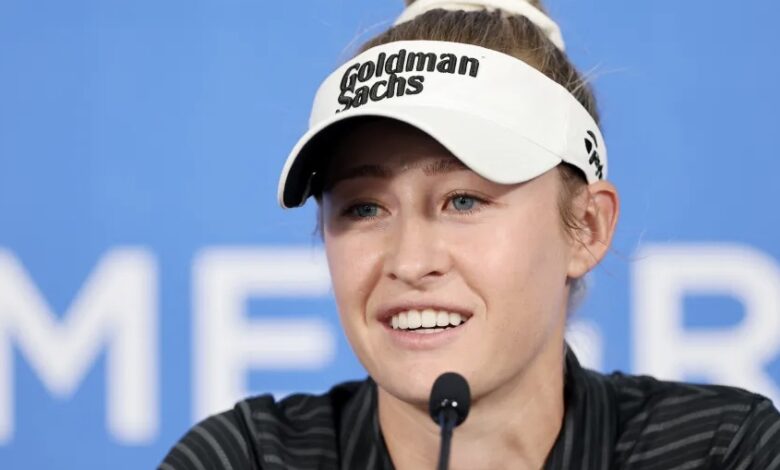‘It’s gotten worse’: Nelly Korda, Lexi Thompson blast LPGA’s slow play problem

The issue of slow play in professional golf is nothing new, but recently, two of the LPGA’s biggest stars, Nelly Korda and Lexi Thompson, have voiced their frustrations about the growing problem on tour. Both Korda and Thompson, known for their competitiveness and high-level performances, have openly criticized the LPGA for not doing enough to address the slow play that has increasingly become a topic of concern among players and fans alike.
Nelly Korda’s Outspoken Criticism
Nelly Korda, currently one of the top-ranked players in the world, has never been one to shy away from speaking her mind, and she did so again when discussing slow play. According to Korda, the problem of slow play has worsened over the years, impacting the flow of the game and, ultimately, the overall experience for everyone involved.
“It’s gotten worse,” Korda said in a recent interview. “I understand that the golf course is challenging, and sometimes things take longer, but it feels like it’s becoming more of an issue in every tournament. The pace is just too slow, and it’s affecting the rhythm of our games.”
Korda’s frustration isn’t just about personal discomfort—it’s about the broader impact on the sport. Slow play not only affects the players themselves but also the fans watching from the course or at home, as well as the television broadcast schedules. As one of the top stars in the game, Korda’s words carry weight, and her call for action is putting more pressure on the LPGA to do something about it.
Lexi Thompson Joins the Chorus
Lexi Thompson, another prominent LPGA player known for her powerful game and fierce competitiveness, echoed Korda’s concerns. Thompson, who has been outspoken about the need for improvements in the game, expressed her dissatisfaction with the slow pace of play, calling it a serious issue that needs immediate attention.
“I feel like we are wasting so much time on the course with unnecessary delays,” Thompson said. “It’s frustrating not just for the players but for the fans who are there to enjoy the game. It’s something that the LPGA needs to address, and it should have been done a long time ago.”
Thompson’s comments come after a series of high-profile incidents where slow play seemed to interrupt the flow of play, often leading to delays in tournaments and making the game less enjoyable for everyone involved.
The Impact on the LPGA Tour
Slow play is a problem that plagues not just the LPGA but professional golf as a whole. While it’s a challenge on the men’s PGA Tour too, the LPGA has been criticized for not implementing stricter pace-of-play policies, which could help curb the issue. For many fans, the sight of players taking too long over shots or engaging in extended deliberations is frustrating, as it detracts from the excitement of the competition.
The issue also impacts the scheduling of events. Golf is a sport that requires precision and focus, but when players take too long between shots, it leads to a loss of rhythm and causes delays for other groups behind them. This can result in longer-than-expected days for both players and fans, as well as potential conflicts with television broadcasting schedules.
Calls for Stronger Action
Both Korda and Thompson have advocated for the LPGA to introduce stronger measures to deal with slow play. Suggestions have included shorter time limits between shots, more on-course officials to monitor pace, and penalties for consistently slow play. Players, especially those at the top of the leaderboard, feel that enforcing these measures could help to maintain the flow of the game and keep the audience engaged.
“At the end of the day, it’s about respecting the time of everyone involved—whether it’s the players, the fans, or the tournament organizers,” Korda said. “We all want to put on a great show, but that can only happen if we keep the game moving.”
A Growing Concern for the Future
With Korda and Thompson bringing the issue of slow play to the forefront, it’s clear that the problem has reached a boiling point on the LPGA Tour. The growing frustration among players suggests that the issue isn’t going away anytime soon unless action is taken. Fans and media outlets alike are also taking notice, and the pressure on the LPGA to implement solutions is only intensifying.
As the conversation around slow play continues to evolve, it will be interesting to see how the LPGA responds to the growing calls for change. The league has made strides in the past when it comes to player conduct and tournament organization, but it remains to be seen whether they will address the issue of slow play with the urgency it demands.
The Way Forward
For now, it’s clear that the solution lies in finding a balance between allowing players to perform at their best and respecting the time and attention of everyone involved in the tournament. Nelly Korda and Lexi Thompson, as voices of the next generation of women’s golf, are leading the charge, pushing for a faster-paced game that remains engaging for fans while maintaining the integrity of the sport.
The future of the LPGA could very well depend on how the league handles this issue. If slow play continues to be a problem, it could have long-lasting effects on the sport’s popularity and player satisfaction. However, if proper action is taken, it could improve the overall experience for players, fans, and viewers—helping to elevate the LPGA to new heights of success.
Stay tuned for more updates on the LPGA’s efforts to address slow play and how Nelly Korda, Lexi Thompson, and other players continue to shape the future of women’s golf.



